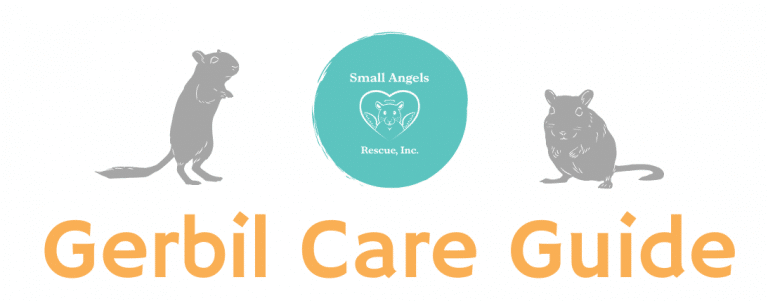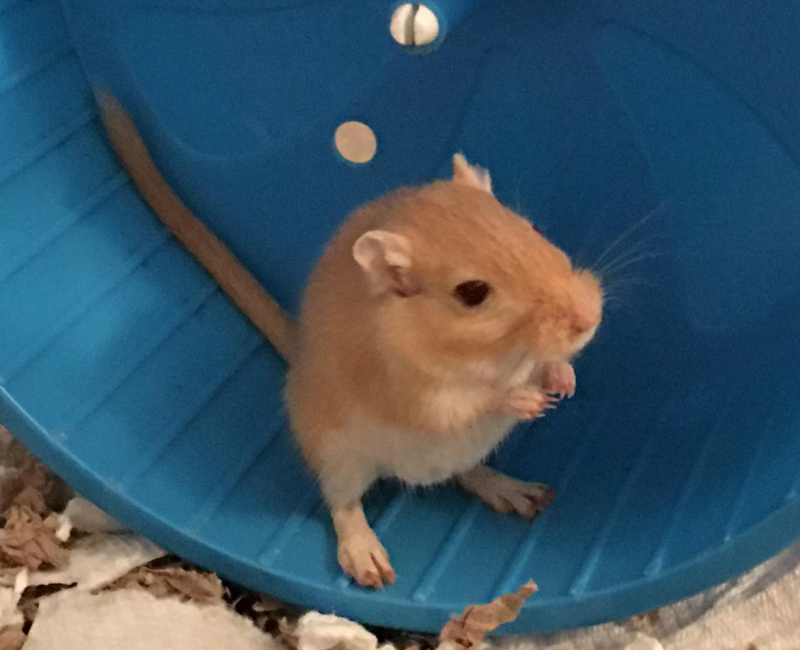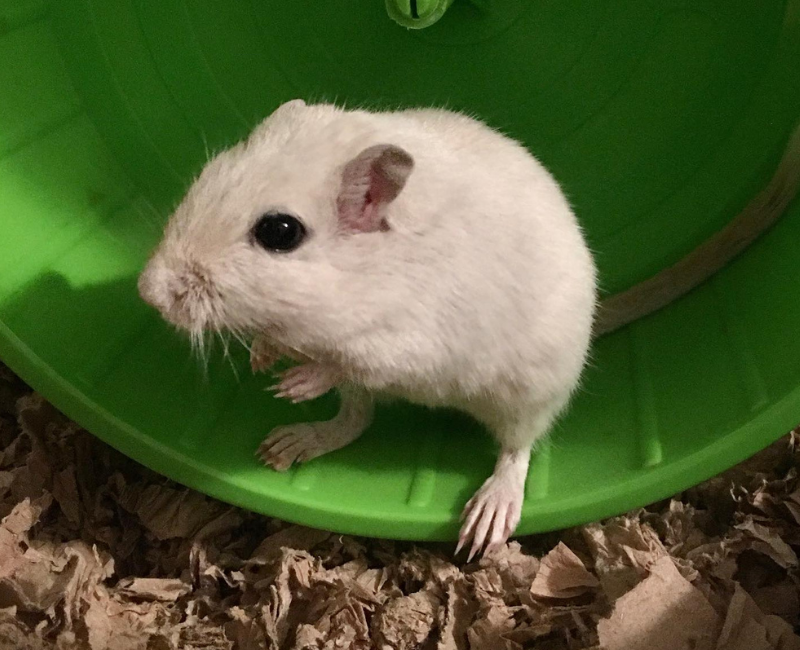Gerbils

Gerbils are amazing little critters that make active and interesting companions. In the wild, gerbils often live in arid habitats such as deserts, shrublands, and grasslands. Gerbils can efficiently process water, dig and maintain tunnels, and chew through tough grasses and wood. They are also very social animals who, in captivity, can often be seen cuddling, playing, and napping with one another. Gerbils can make great pets for older children and adults, but are too fast to be easily handled by young children. With proper care and companionship, a gerbil’s lifespan is about three to five years.
Habitat Requirements
- Minimum habitat size: 40 gallon aquarium tank or bin-cage of a similar size
- Must have mesh lid to prevent gerbils from escaping
- Play area: gerbils will climb wire playpens. Empty pop-up ball pits designed for
children work very well as a play area for gerbils - Appropriate wheel: solid plastic upright wheel at least 8 inches or larger
depending on the size of the gerbil - Clean wheel and habitat at least once a week
- Must have accessible water bottle at all times
Bedding
- Preferred: Kaytee Clean and Cozy- Natural
- Second Option: Oxbow Pure Comfort Small Animal Bedding- Natural or Blend
- Third Option: Carefresh Small Animal Bedding- Natural
Food
- Preferred: Higgins Sunburst Gerbil and Hamster food mixed with Oxbow Essentials Gerbil and hamster food
- Second Option: Oxbow Garden Select Gerbil and Hamster food
- Third Option: Sunseed Vita Prima Gerbil and Hamster Food
Hay
- Preferred: Small Pet Select timothy hay or oat hay
- Second Option: Oxbow timothy hay or oat hay
Bathing Sand
- Zoo Med Reptisand Desert White is the best, most accessible sand for gerbils. Other brands of small animal sand are often harmful to a gerbil’s respiratory system.
- It’s best to supervise your gerbil or gerbils while they have access to sand. Some gerbils will eat their sand and become ill.
Snacks
- Unsalted pumpkin seeds
- Oats
- Unsalted cashews
- Carrots
- Dried Mealworms
- Dried Grasshoppers
- Dried Crickets
- Apples
- Dried bananas
- Alfalfa cubes
- Dried pear
- Peas
- Green beans
- Small amounts of cucumber
- Spinach
- Cauliflower
- Broccoli
Tricky Behaviors
Gerbils can de-clan, or “break-up.” When gerbils try to go their separate ways in captivity it ends in fighting. Unfortunately, these fights can be lethal and the gerbils need to be separated as soon as possible. Gerbils can de-clan even if you do everything right, but there are some steps to help a break-up become less likely. When cleaning your gerbil’s home, mix in some of the old bedding in with the new. Gerbils are scent oriented and will respond positively to environments that smell like everyone in the clan. Gerbils should also be kept together in temporary housing or a secure play area while you clean their habitat. Only provide one house for sleeping so your gerbils will sleep together and strengthen their bond. If you notice your gerbils are no longer sleeping together, they could potentially de-clan and it’s a good idea to have back up housing on hand. If your gerbils have small pushing spats, this does not necessarily mean that they will de-clan, they are probably sorting out dominance, but it is important to keep an eye on aggressive behavior, especially if it seems to be escalating. Once a gerbil bites another gerbil and draws blood, they should no longer be kept together. That being said, bonded gerbils are very affectionate with one another and it is enjoyable keeping them. As long as you keep the warning signs in mind, take steps to reinforce their bond, and provide an appropriate sized habitat, your gerbils are likely to stay together.
Common Signs of Illness*
- Sudden weight loss or weight gain
- Lumps on or around the scent gland
- Presence of porphyrin, a pinkish red substance, around nose and eyes (can cause itching and irritation and can be a sign of stress and/or lead to secondary infections)
- Sudden or gradual reduction in energy
- Refusal to eat or drink
- Low body temperature, gerbil is cold to the touch and fluffs up fur in an attempt to warm themself
* This is not a complete list and gerbils are often very good at covering up signs of
illness. Weighing your gerbil semi-regularly can help catch early signs of illness.
Download the Gerbil Care Guide


